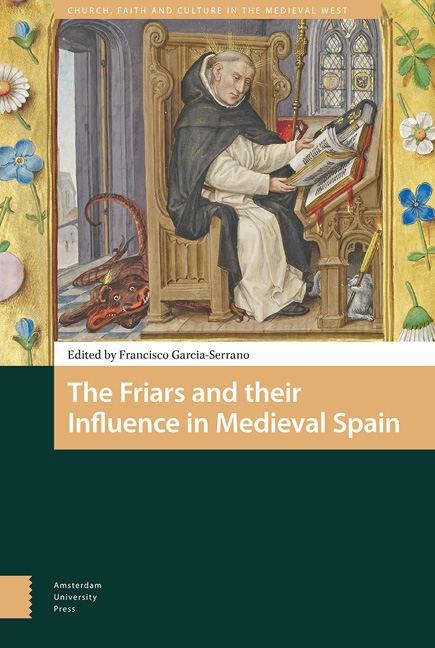Book contents
- Frontmatter
- Contents
- Abbreviations
- List of Illustrations
- Acknowledgements
- Introduction
- 1 Dominicus Hispanus
- 2 Ramon de Penyafort and His Influence
- 3 The Mendicant Orders and the Castilian Monarchy in the Reign of Ferdinand III
- 4 Ramon Marti, the Trinity, and the Limits of Dominican Mission
- 5 Narrative and Counter-Narrative: Dominican and Muslim Preaching in Medieval Iberia
- 6 The Poor Clares of Alcocer and the Castilian Crown (Thirteenth to Fifteenth Centuries)
- 7 Friars and Nuns: Dominican Economy and Religious Identity in Medieval Castile
- 8 Networks of Dissent and the Franciscans of the Crown of Aragon
- 9 Faction, Politics, and Dominican Inquisitors in the Fourteenth-Century Crown of Aragon
- 10 Sutzura e Viltat Carnal: The Place of Sin and Lust in the Treatises of the Franciscan Francesc Eiximenis (c.1400)
- 11 Valencian Dominicans Beyond the Convent of Santo Domingo
- 12 Ferdinand of Antequera and Santo Domingo el Real de Toledo: Patronage, Advice, and Spiritual Favour (c.1390–1416)
- Index
6 - The Poor Clares of Alcocer and the Castilian Crown (Thirteenth to Fifteenth Centuries)
Published online by Cambridge University Press: 16 February 2021
- Frontmatter
- Contents
- Abbreviations
- List of Illustrations
- Acknowledgements
- Introduction
- 1 Dominicus Hispanus
- 2 Ramon de Penyafort and His Influence
- 3 The Mendicant Orders and the Castilian Monarchy in the Reign of Ferdinand III
- 4 Ramon Marti, the Trinity, and the Limits of Dominican Mission
- 5 Narrative and Counter-Narrative: Dominican and Muslim Preaching in Medieval Iberia
- 6 The Poor Clares of Alcocer and the Castilian Crown (Thirteenth to Fifteenth Centuries)
- 7 Friars and Nuns: Dominican Economy and Religious Identity in Medieval Castile
- 8 Networks of Dissent and the Franciscans of the Crown of Aragon
- 9 Faction, Politics, and Dominican Inquisitors in the Fourteenth-Century Crown of Aragon
- 10 Sutzura e Viltat Carnal: The Place of Sin and Lust in the Treatises of the Franciscan Francesc Eiximenis (c.1400)
- 11 Valencian Dominicans Beyond the Convent of Santo Domingo
- 12 Ferdinand of Antequera and Santo Domingo el Real de Toledo: Patronage, Advice, and Spiritual Favour (c.1390–1416)
- Index
Summary
Abstract
The foundation of the Poor Clares monastery at Alcocer (c.1260) by King Alfonso X is the result of this monarch's family policies, particularly in relation to his former mistress, Mayor Guillén of Guzmán, as well as a step further in the process of the establishment of the Franciscan Order in the central regions of Castile. On the grounds of being considered a royal foundation, the Poor Clares community would thereafter continue to be tied to the Castilian monarchy to the end of the Middle Ages, oscillating between periods of more and less intense commitment.
Keywords: medieval Castile, Nuns, Alfonso X, Poor Clares, Alcocer, Mayor Guillén de Guzmán
Introduction
This study is concerned with the policies of the Castilian crown towards the mendicants in the last three centuries of the Middle Ages, and focuses on the Poor Clares at Alcocer, a little town near the northern border of the diocese of Cuenca (and nowadays, near the southern border of the administrative province of Guadalajara) in central Spain, not very far from the border between Castile and Aragon. It is still a matter of debate whether the main role in the royal protection of mendicant foundations in thirteenth-century Castile should be assigned to Ferdinand III (1217–1252) or to Alfonso X (1252–1284). But in the case of Alcocer we are dealing with Alfonso. In fact, the matter is intimately related to Alfonso, for the very foundation of this Poor Clare community cannot be explained without due reference to the Learned King's personal life. During seven decades, the memory of the connection with Alfonso was an essential part of the history of the community, and though subsequently that memory waned for some time, it would ultimately be recalled and reshaped in the subsequent relations between that ‘royal monastery’ and the Castilian crown until the end of the Middle Ages.
Although both the Poor Clare convent at Alcocer and its founders have been subject to some attention by historians, and information on the topic is to be found scattered in a variety of studies, the most intensive research line concerning the community is still in progress, and thus this present work is to be considered partly a result of and partly a contribution to that research.
- Type
- Chapter
- Information
- The Friars and their Influence in Medieval Spain , pp. 143 - 158Publisher: Amsterdam University PressPrint publication year: 2018



